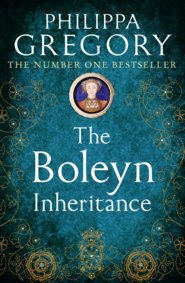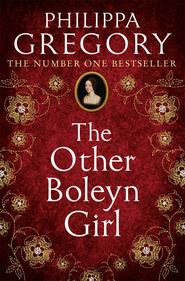По всем вопросам обращайтесь на: info@litportal.ru
(©) 2003-2025.
✖
Philippa Gregory 3-Book Tudor Collection 1: The Constant Princess, The Other Boleyn Girl, The Boleyn Inheritance
Настройки чтения
Размер шрифта
Высота строк
Поля
But if I have misunderstood something, then something is very wrong, and we are all indeed mortal, perhaps we can fail. Even handsome Hernando Perez del Pulgar and his laughing friends, even my mother and father can fail. If Hernando can die, then so too can my mother and father. And if this is so, then what safety is there in the world? If Madre can die, like a common soldier, like a mule pulling a baggage cart, as I have seen men and mules die, then how can the world go on? How could there be a God?
Then it was time for her mother’s audience for petitioners and friends, and suddenly he was there, in his best suit, his beard combed, his eyes dancing, and the whole story spilled out: how they had dressed in their Arab clothes so as to pass for townspeople in the darkness, how they had crept in through the postern gate, how they had dashed up to the mosque, how they had kneeled and gabbled an Ave Maria and stabbed the prayer into the floor of the mosque, and then, surprised by guards, they had fought their way, hand to hand, thrust and parry, blades flashing in the moonlight; back down the narrow street, out of the door that they had forced only moments earlier, and were away into the night before the full alarm had been sounded. Not a scratch on them, not a man lost. A triumph for them and a slap in the face for Granada.
It was a great joke to play on the Moors, it was the funniest thing in the world to take a Christian prayer into the very heart of their holy place. It was the most wonderful gesture to insult them. The queen was delighted, the king too, the princess and her sisters looked at their champion, Hernando Perez del Pulgar, as if he were a hero from the romances, a knight from the time of Arthur at Camelot. Catalina clapped her hands in delight at the story, and commanded that he tell it and re-tell it, over and over again. But in the back of her mind, pushed far away from thought, she remembered the chill she had felt when she had thought that he was not coming back.
Next, they waited for the reply from the Moors. It was certain to happen. They knew that their enemy would see the venture as the challenge that it was, there was bound to be a response. It was not long in coming.
The queen and her children were visiting Zubia, a village near to Granada, so Her Majesty could see the impregnable walls of the fort herself. They had ridden out with a light guard and the commander was white with horror when he came dashing up to them in the little village square and shouted that the gates of the red fort had opened and the Moors were thundering out, the full army, armed for attack. There was no time to get back to camp, the queen and the three princesses could never outrun Moorish horsemen on Arab stallions, there was nowhere to hide, there was nowhere even to make a stand.
In desperate haste Queen Isabella climbed to the flat roof of the nearest house, pulling the little princess by her hand up the crumbling stairs, her sisters running behind. ‘I have to see! I have to see!’ she exclaimed.
‘Madre! You are hurting me!’
‘Quiet, child. We have to see what they intend.’
‘Are they coming for us?’ the child whimpered, her little voice muffled by her own plump hand.
‘They may be. I have to see.’
It was a raiding party, not the full force. They were led by their champion, a giant of a man, dark as mahogany, a glint of a smile beneath his helmet, riding a huge black horse as if he were Night riding to overwhelm them. His horse snarled like a dog at the watching guard, its teeth bared.
‘Madre, who is that man?’ the Princess of Wales whispered to her mother, staring from the vantage point of the flat roof of the house.
‘That is the Moor called Yarfe, and I am afraid he has come for your friend, Hernando.’
‘His horse looks so frightening, like it wants to bite.’
‘He has cut off its lips to make it snarl at us. But we are not made fearful by such things. We are not frightened children.’
‘Should we not run away?’ asked the frightened child.
Her mother, watching the Moor parade, did not even hear her daughter’s whisper.
‘You won’t let him hurt Hernando, will you? Madre?’
‘Hernando laid the challenge. Yarfe is answering it. We will have to fight,’ she said levelly. ‘Yarfe is a knight, a man of honour. He cannot ignore the challenge.’
‘How can he be a man of honour if he is a heretic? A Moor?’
‘They are most honourable men, Catalina, though they are unbelievers. And this Yarfe is a hero to them.’
‘What will you do? How shall we save ourselves? This man is as big as a giant.’
‘I shall pray,’ Isabella said. ‘And my champion Garallosco de la Vega will answer Yarfe for Hernando.’
As calmly as if she were in her own chapel at Cordoba, Isabella kneeled on the roof of the little house and gestured that her daughters should do the same. Sulkily, Catalina’s older sister, Juana, dropped to her knees, the princesses Isabel and Maria, her other two older sisters, followed suit. Catalina saw, peeping through her clasped hands as she kneeled in prayer, that Maria was shaking with fear, and that Isabel, in her widow’s gown, was white with terror.
‘Heavenly Father, we pray for the safety of ourselves, of our cause, and of our army.’ Queen Isabella looked up at the brilliantly blue sky. ‘We pray for the victory of Your champion, Garallosco de la Vega, at this time of his trial.’
‘Amen,’ the girls said promptly, and then followed the direction of their mother’s gaze to where the ranks of the Spanish guard were drawn up, watchful and silent.
‘If God is protecting him…’ Catalina started.
‘Silence,’ her mother said gently. ‘Let him do his work, let God do His, and let me do mine.’ She closed her eyes in prayer.
Catalina turned to her eldest sister and pulled at her sleeve. ‘Isabel, if God is protecting him, then how can he be in danger?’
Isabel looked down at her little sister. ‘God does not make the way smooth for those He loves,’ she said in a harsh whisper. ‘He sends hardships to try them. Those that God loves the best are those who suffer the worst. I know that. I, who lost the only man that I will ever love. You know that. Think about Job, Catalina.’
‘Then how shall we win?’ the little girl demanded. ‘Since God loves Madre, won’t He send her the worst hardships? And so how shall we ever win?’
‘Hush,’ their mother said. ‘Watch. Watch and pray with faith.’
Their small guard and the Moorish raiding party were drawn up opposite each other, ready for battle. Then Yarfe rode forwards on his great black charger. Something white bobbed at the ground, tied to the horse’s glossy black tail. There was a gasp as the soldiers in the front rank recognised what he had. It was the Ave Maria that Hernando had left speared to the floor of the mosque. The Moor had tied it to the tail of his horse as a calculated insult, and now rode the great creature forwards and back before the Christian ranks, and smiled when he heard their roar of rage.
‘Heretic,’ Queen Isabella whispered. ‘A man damned to hell. God strike him dead and scourge his sin.’
The queen’s champion, de la Vega, turned his horse and rode towards the little house where the royal guards ringed the courtyard, the tiny olive tree, the doorway. He pulled up his horse beside the olive tree and doffed his helmet, looking up at his queen and the princesses on the roof. His dark hair was curly and sparkling with sweat from the heat, his dark eyes sparkled with anger. ‘Your Grace, do I have your leave to answer his challenge?’
‘Yes,’ the queen said, never shrinking for a moment. ‘Go with God, Garallosco de la Vega.’
‘That big man will kill him,’ Catalina said, pulling at her mother’s long sleeve. ‘Tell him he must not go. Yarfe is so much bigger. He will murder de la Vega!’
‘It will be as God wills,’ Isabella maintained, closing her eyes in prayer.
‘Mother! Your Majesty! He is a giant. He will kill our champion.’
Her mother opened her blue eyes and looked down at her daughter and saw her little face was flushed with distress and her eyes were filling with tears. ‘It will be as God wills it,’ she repeated firmly. ‘You have to have faith that you are doing God’s will. Sometimes you will not understand, sometimes you will doubt, but if you are doing God’s will you cannot be wrong, you cannot go wrong. Remember it, Catalina. Whether we win this challenge or lose it, it makes no difference. We are soldiers of Christ. You are a soldier of Christ. If we live or die, it makes no difference. We will die in faith, that is all that matters. This battle is God’s battle, He will send a victory, if not today, then tomorrow. And whichever man wins today, we do not doubt that God will win, and we will win in the end.’
‘But de la Vega…’ Catalina protested, her fat lower lip trembling.
‘Perhaps God will take him to His own this afternoon,’ her mother said steadily. ‘We should pray for him.’
Juana made a face at her little sister, but when their mother kneeled again the two girls clasped hands for comfort. Isabel kneeled beside them, Maria beside her. All of them squinted through their closed eyelids to the plain where the bay charger of de la Vega rode out from the line of the Spaniards, and the black horse of the Moor trotted proudly before the Saracens.
The queen kept her eyes closed until she had finished her prayer, she did not even hear the roar as the two men took up their places, lowered their visors, and clasped their lances.
Catalina leapt to her feet, leaning over the low parapet so that she could see the Spanish champion. His horse thundered towards the other, racing legs a blur, the black horse came as fast from the opposite direction. The clash when the two lances smacked into solid armour could be heard on the roof of the little house, as both men were flung from their saddles by the force of the impact, the lances smashed, their breastplates buckled. It was nothing like the ritualised jousts of the court. It was a savage impact designed to break a neck or stop a heart.
‘He is down! He is dead!’ Catalina cried out.
‘He is stunned,’ her mother corrected her. ‘See, he is getting up.’
The Spanish knight staggered to his feet, unsteady as a drunkard from the heavy blow to his chest. The bigger man was up already, helmet and heavy breastplate cast aside, coming for him with a huge sickle sword at the ready, the light flashing off the razor-sharp edge. De la Vega drew his own great weapon. There was a tremendous crash as the swords smacked together and then the two men locked blades and struggled, each trying to force the other down. They circled clumsily, staggering under the weight of their armour and from their concussion; but there could be no doubt that the Moor was the stronger man. The watchers could see that de la Vega was yielding under the pressure. He tried to spring back and get free; but the weight of the Moor was bearing down on him and he stumbled and fell. At once the black knight was on top of him, forcing him downwards. De la Vega’s hand closed uselessly on his long sword, he could not bring it up. The Moor raised his sword to his victim’s throat, ready to give the death blow, his face a black mask of concentration, his teeth gritted. Suddenly he gave a loud cry and fell back. De la Vega rolled up, scrabbled to his feet, crawling on his hands and knees like a rising dog.
The Moor was down, plucking at his breast, his great sword dropped to one side. In de la Vega’s left hand was a short stabbing dagger stained with blood, a hidden weapon used in a desperate riposte. With a superhuman effort the Moor got to his feet, turned his back on the Christian and staggered towards his own ranks. ‘I am lost,’ he said to the men who ran forwards to catch him. ‘We have lost.’
At a hidden signal the great gates of the red fort opened and the soldiers started to pour out. Juana leapt to her feet. ‘Madre, we must run!’ she screamed. ‘They are coming! They are coming in their thousands!’












